2011-2012
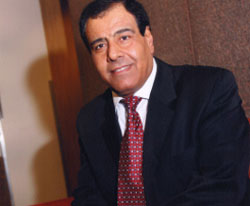
Izzeldin Abuelaish
Dr. Izzeldin Abuelaish, MD, MPH, is Palestinian medical doctor who was born and raised in the Jabalia refugee Camp is a passionate and eloquent proponent of peace between Palestinians and Israelis. Before his three daughters were killed in January 2009 during the Israeli incursion into Gaza, Dr. Abuelaish worked as a researcher at the Gertner Institute at the Sheba Hospital in Tel Aviv. Abuelaish has been an important figure in the Israeli-Palestinian relations for years, working in Israeli hospitals, treating Israeli and Palestinian patients and fully believe that health is an engine for the journey to peace. This horrific tragedy did not harden Abuelaish’s heart; neither did it weaken his resolve to act for humanity. He continues to live up the description bestowed upon him by an Israeli colleague, as a magical, secret bridge between Israelis and Palestinians.Dr. Izzeldin Abuelaish currently is Associate Professor of Medicine at the Dalla Lana School of Public Health; University Of Toronto. He has been invited to give speeches in The European Parliament, Belgian Parliament, House of Commons, the American Congress, state department, Forum 2000 in Prague. In addition, he has given speeches all over the world in academic institutions, Universities and organizations in Canada, USA and Europe.
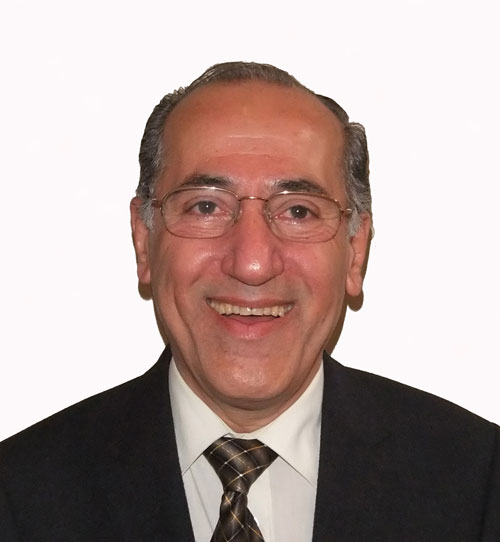
Mowaffak Al-Rubaie
In recognition of an extraordinary lifetime of statesmanship and diplomacy, marked by courageous opposition to tyranny and for astute and brave efforts to forge a secure future for Iraq.
Dr. Mowaffak al-Rubaie is an Iraqi politician and was appointed as a member of the 25 member Iraqi Governing Council by the Coalition Provisional Authority in July 2003. In April 2004,in recognition of his astute understanding of the risks and challenges faced by Iraq, he was appointed as National Security Advisor (NSA) by the Coalition Provisional Authority. He held this post for its full five-year term until April 2009, when he was appointed as an MP in Iraq's Council of Representatives (Iraq's Parliament), a role he held until Parliament's dissolution in March 2010.
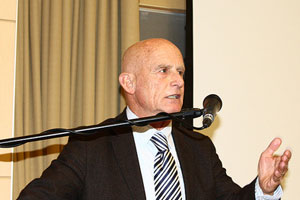
Ami Ayalon
In recognition of extraordinarily thoughtful and courageous service to your country and for passionately heightening the demands of normative, ethical citizenship in the struggle for peace.
Israeli politician and a former member of Israeli Parliament for the Labor Party, former Commander-in-Chief of the Israeli Navy, and recipient of Israel's highest decoration - the Medal of Valor. Following Prime Minister Rabin’s assassination, Ayalon was head of the Shin Bet, Israel’s internal security service. In 2003, Ayalon launched, together with Palestinian Professor Sari Nusseibeh, a peace initiative, "The People’s Voice,” calling for a two-state solution with Jerusalem as an open city, the capital of two states.
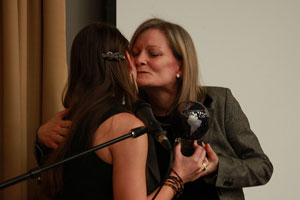
Susan Bissell
In acknowledgment of your highly significant career in innovative, compassionate global service to protect society's most vulnerable, the children of the world.
Susan Bissel, Chief of Child Protection at UNICEF, first joined the organization in 1987 working with the Division of Information and Public Affairs. She holds a Master’s degree from the University of Toronto in law, economics and education and a PhD in public health at medical anthropology at the WHO Key Center for Women’s Health, Faculty of Medicine, University of Melbourne. She returned to UNICEF in 2001 as the Chief of Child Protection in India then in 2004 she transferred to the Innocenti Research Center where she managed the Implementing International Standards Unit. As member of the Editorial Board of the report of the UN Secretary General’s Study on Violence Against Children which was released in 2006, Susan has also been involved in follow-up activities that will advance the implementation of the recommendations of the UN Study.
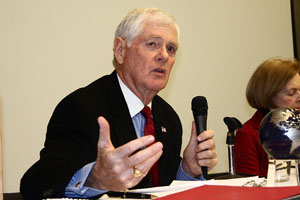
Dirk Jameson
In acknowledgment of your thoughtful and valorous service to the United States, and in recognition of decades of impressive military and executive leadership toward the nation’s defense
Lt. General Dirk Jameson served as Deputy Commander in Chief and Chief of Staff of U.S. Strategic Command before retiring from the U.S. Air Force in 1996 after more than three decades of active service. Gen. Jameson was responsible for directing the headquarters staff of 4,000 men and women and participating in numerous nuclear forums with the leaders of the Russian Federation Strategic Rocket Forces. Prior to his StratCom assignment, Gen. Jameson commanded the 14,500 men and women of the U.S. 20th Air Force, and was responsible for all U.S. Intercontinental Ballistic Missiles, seven major subordinate units, operational training, testing, security and readiness. Gen. Jameson also served as the Chief of Staff, Strategic Air Command and commanded the USAF Strategic Missile Center at Vandenberg AFB, California. There, he directed the activities of the Air Force’s third largest base, staffed with 10,000 military, civilian and contractor employees. General Jameson had numerous other nuclear related assignments including Director of Command Control, Strategic Air Command, 4th Air Division Commander and Commander of the 90th Strategic Missile Wing.
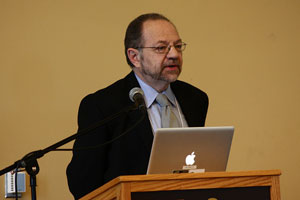
Jonathan Moreno
In recognition of your insightful intellectual prowess and scholarly acumen in the passionate pursuit of integrative knowledge and wisdom and for service rendered at the highest levels of government.
Jonathan D. Moreno is a Senior Fellow at American Progress, where he edits the magazine, Science Progress. He is one of 13 Penn Integrates Knowledge university professors at the University of Pennsylvania. He is also professor of medical ethics and health policy, of history and sociology of science, and of philosophy. In 2008-09 he served as a member of President Barack Obama’s transition team. Moreno is an elected member of the Institute of Medicine/National Academy of Sciences and is a national associate of the National Research Council. He has served as a senior staff member for three presidential advisory commissions, including the current bioethics commission under President Obama, and has given invited testimony for both houses of Congress. Moreno has served as adviser to many nongovernmental organizations, including the Howard Hughes Medical Institute and the Bill and Melinda Gates Foundation. He is a member of the Governing Board of the International Neuroethics Society, a faculty affiliate of the Kennedy Institute of Ethics at Georgetown University, a fellow of the Hastings Center and the New York Academy of Medicine, and a past president of the American Society for Bioethics and Humanities. He advises various science, health, and national security agencies and serves as a member of the Defense Intelligence Agency’s TIGER committee on potentially disruptive novel technologies.
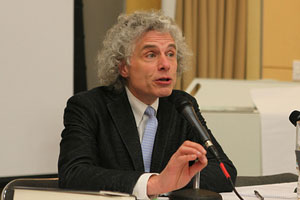
Steven Pinker
In acknowledgment of an extraordinary distinguished academic career, marked by creative intellectual ferment at the frontiers of interdisciplinary knowledge and distinguished by powerful humanistic sensibilities.
Steven Pinker, a Canadian-American experimental psychologist, cognitive scientist, linguist and popular science author, is the Harvard College Professor of Psychology at Harvard University and is known for his advocacy of evolutionary psychology and the computational theory of mind. A two-time Pulitzer Prize finalist and the winner of many awards for his research, teaching and books, he has been named one of Time’s 100 Most Influential People in the World Today and Foreign Policy’s 100 Global Thinkers.
Pinker is the Chair of the Usage Panel of The American Heritage Dictionary and has served as editor or advisor for numerous scientific, scholarly, media, and humanist organizations, including the American Association the Advancement of Science, the National Science Foundation, the American Academy of Arts and Sciences, the American Psychological Association, and the Linguistics Society of America. He has won many prizes for his books (including the William James Book Prize three times, the Los Angeles TimesScience Book Prize, and the Eleanor Maccoby Book Prize), his research (including the Troland Research Prize from the National Academy of Sciences, the Early Career Award from the American Psychological Association, and the Henry Dale Prize from the Royal Institution of Great Britain), and his graduate and undergraduate teaching. He is also a Humanist Laureate, the 2006 Humanist of the Year, recipient of the 2008 Innovations for Humanity Award from La Ciudad de las Ideas in Mexico, the 2008 Honorary President of the Canadian Psychological Association, and the recipient of six honorary doctorates.His most recent book is entitled The Better Angels of Our Nature: Why Violence Has Declined (2011).
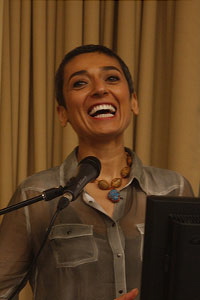
Zainab Salbi
In recognition of your courage and your dedication to women survivors of war and the search for sustainable ways to alleviate human suffering.
Zainab Salbi is the founder of Women for Women International and served as the organization's CEO from 1993 to 2011. Women for Women International is a grassroots humanitarian and development organization helping women survivors of wars rebuild their lives. Since 1993, the organization has helped 316,000 women survivors of wars access social and economic opportunities through a program of rights awareness training, vocational skills education and access to income generating opportunities, thereby ultimately contributing to the political and economic health of their communities. In its 18-year history, the organization has distributed more than $103 million in direct aid, micro credit loans, and has impacted more than 1.7 million family members. Zainab Salbi is the author of two books; a national bestseller "Between Two Worlds: Escape from Tyranny: Growing Up in the Shadow of Saddam” (with Laurie Becklund) that documents her life under Saddam Hussein’s rule and “The Other Side of War: Women's Stories of Survival and Hope." Her work has been featured in major media outlets, including 8 appearances on “The Oprah Winfrey Show”, CNN, The Washington Post, and The New York Times.
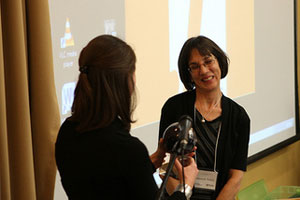
Susannah Sirkin
In recognition of your distinguished career of highly effective leadership advocating for the fusion of health and human rights and for your precedent setting, unflinching global investigations on the most sensitive of issues.
Susannah Sirkin is Deputy Director at Physicians for Human Rights, a position she has held since 1987 when she joined PHR shortly after its founding. She has helped lead PHR's campaigns against Persecution of Health Workers, including the current efforts to free the Alaei brothers, two Iranian doctors with expertise in HIV/AIDS treatment who are imprisoned in Tehran on false charges. Susannah has organized health and human rights investigations to dozens of countries, including recent documentation of genocide and systematic rape in Darfur, Sudan; PHR's exhumations of mass graves in the former Yugoslavia and Rwanda for the International Criminal Tribunals; investigations into consequences of human rights abuses and violations of international humanitarian law in Afghanistan, El Salvador, Haiti, India, Iraq, Israel/Palestine, Kosovo, Kuwait, Somalia, Turkey and the US among others. She has worked on studies of sexual violence in Bosnia, Sierra Leone, and Thailand, and authored and edited numerous reports and articles on the medical consequences of human rights violations, physical evidence of human rights abuses, and physician complicity in violations
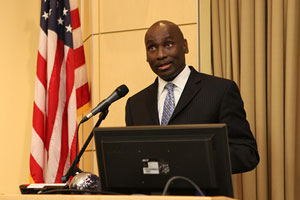
Abiodun Williams
In acknowledgement of your truly distinguished academic and professional career at the very highest levels of global governance, marked by a passionate, ethical concern for those in distress and need.
Abiodun Williams is acting senior vice president of the Center for Conflict Management (CCM). Williams leads USIP’s work in major conflict zones such as Afghanistan, Iraq, Pakistan, the Middle East and North Africa. Previously, Williams served as vice president of CCM, and had primary responsibility for USIP’s work on conflict prevention, Iran, and Northeast Asia. Prior to joining USIP, he served as associate dean of the Africa Center for Strategic Studies at the National Defense University. From 2001 to 2007, he served as director of strategic planning in the Office of the United Nations Secretary-General. In that capacity, he advised Secretaries-General Kofi Annan and Ban Ki-moon on a full range of strategic issues including U.N. reform, conflict prevention, peace building and international migration.
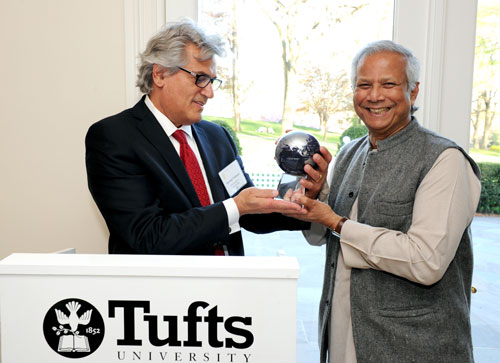 Muhammad Yunus
Muhammad Yunus
Professor Muhammad Yunus established the Grameen Bank in Bangladesh in 1983, fueled by the belief that credit is a fundamental human right. His objective was to help poor people escape from poverty by providing loans on terms suitable to them and by teaching them a few sound financial principles so they could help themselves.
From Dr. Yunus' personal loan of small amounts of money to destitute basketweavers in Bangladesh in the mid-70s, the Grameen Bank has advanced to the forefront of a burgeoning world movement toward eradicating poverty through microlending. Replicas of the Grameen Bank model operate in more than 100 countries worldwide.
Born in 1940 in the seaport city of Chittagong, Professor Yunus studied at Dhaka University in Bangladesh, then received a Fulbright scholarship to study economics at Vanderbilt University. He received his Ph.D. in economics from Vanderbilt in 1969 and the following year became an assistant professor of economics at Middle Tennessee State University. Returning to Bangladesh, Yunus headed the economics department at Chittagong University.
Professor Yunus is the recipient of numerous international awards for his ideas and endeavors, including the Mohamed Shabdeen Award for Science (1993), Sri Lanka; Humanitarian Award (1993), CARE, USA; World Food Prize (1994), World Food Prize Foundation, USA; lndependence Day Award (1987), Bangladesh's highest award; King Hussein Humanitarian Leadership Award (2000), King Hussien Foundation, Jordan; Volvo Environment Prize (2003), Volvo Environment Prize Foundation, Sweden; Nikkei Asia Prize for Regional Growth (2004), Nihon Keizai Shimbun, Japan; Franklin D. Roosevelt Freedom Award (2006), Roosevelt Institute of The Netherlands; and the Seoul Peace Prize (2006), Seoul Peace Prize Cultural Foundation, Seoul, Korea. He is a member of the board of the United Nations Foundation.

